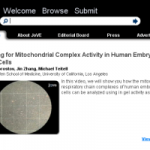Yes, a somewhat unusual topic, but a HONORABLE MENTION in the “2008 Visualization Challenge“shows an
illustrated Bible with a modern twist. Römhild started with a list of verses in different versions of both the Old and New Testaments that referred to figures or ideas from earlier passages, then combed through both books for additional examples. Using a custom-built computer program, Harrison translated the trove of data into “Visualizing the Bible.” … “It almost looks like one monolithic volume”.
true observation or wishful thinking?
